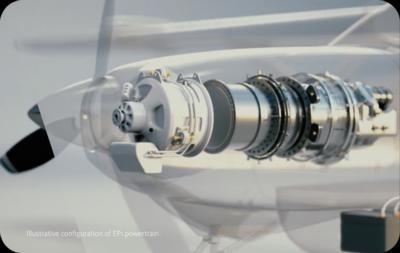Wed, Nov 29, 2023
Regional Operator Hopes Operational Costs Halve After Conversion
Surf Air Mobility will embark on a campaign to convert its Cessna 208 Caravan fleet to all-electric power, working with Brazilian company Azul.

The carrier says they can “take a meaningful step toward their goal of net-zero carbon emissions by 2045.” They believe they can achieve certification of a proprietary electrified powertrain some time in 2026, working with Azul to propagate emissions-free tech across the regional airline industry - or, in their terms, the “regional air mobility market”. Azul operates 27 Caravans throughout Brazil, serving 80 discrete destinations. Even the 1st generation electric powertrain is hoped to reduce direct operating costs by up to 50%, though the firm is careful to note they reduce (direct) emissions by 100%. New routes previously too costly for JetA turboprops may be in the cards, should the electric powertrain prove as affordable as promised.
Surf Air will collaborate with Azul to create a "clearer pathway for certification of electrified aircraft".
“It’s important for Surf Air Mobility to develop our technology with operators that will be the direct beneficiaries of the coming transition to electrified aircraft. We’re very excited to work with Azul to help us design our technology and define how our electric powertrains can best be deployed within an existing regional network in order for passengers to gain as much benefit from the technology as possible,” said Stan Little, CEO of Surf Air Mobility. “With Azul’s support, we believe we can further accelerate the Supplemental Type Certification process and bring the technology to market faster and with more certainty."
"It is with great pleasure that we receive the opportunity to collaborate with Surf Air Mobility in the evolution of technology for electrified aircraft. The partnership between the two companies will be crucial for the successful development and implementation of these innovations," said Flavio Costa, president of Azul Conecta. "We look forward to working together, designing the technology, and integrating our electric motors into our fleet in an optimized way. We believe that with this agreement signed, we can accelerate the certification process, ensuring a quicker and safer introduction of this revolutionary technology to the market, thereby positively transforming the future of the airline sector.”
More News
Also: 1st-Ever Space Crime Was a Fraud, IAE Buys Diamonds, Kennon Bows Out, Perseverance Rover An interesting moment came about this past Sunday as ANN CEO, Jim Campbell, noted tha>[...]
Have A Story That NEEDS To Be Featured On Aero-News? Here’s How To Submit A Story To Our Team Some of the greatest new stories ANN has ever covered have been submitted by our>[...]
From 2023 (YouTube Edition): Deviation from the Historical Mean Racine, Wisconsin-based DeltaHawk is a privately-held manufacturer of reciprocating engines for aircraft and hybrid >[...]
Smoke Began Entering The Cockpit During The Landing Flare, And Then The Pilot Noticed Flames On The Right Side Of The Airplane Analysis: The pilot reported that about 30 minutes in>[...]
Remote Communications Outlet (RCO) An unmanned communications facility remotely controlled by air traffic personnel. RCOs serve FSSs. Remote Transmitter/Receivers (RTR) serve termi>[...]
 Airborne 11.24.25: ANN's 30th!, Starships V3 Booster Boom, Earhart Records
Airborne 11.24.25: ANN's 30th!, Starships V3 Booster Boom, Earhart Records ANN FAQ: Submit a News Story!
ANN FAQ: Submit a News Story! Classic Aero-TV: DeltaHawk Aero Engine Defies Convention
Classic Aero-TV: DeltaHawk Aero Engine Defies Convention NTSB Final Report: Glasair GlaStar
NTSB Final Report: Glasair GlaStar ANN's Daily Aero-Term (11.22.25): Remote Communications Outlet (RCO)
ANN's Daily Aero-Term (11.22.25): Remote Communications Outlet (RCO)



